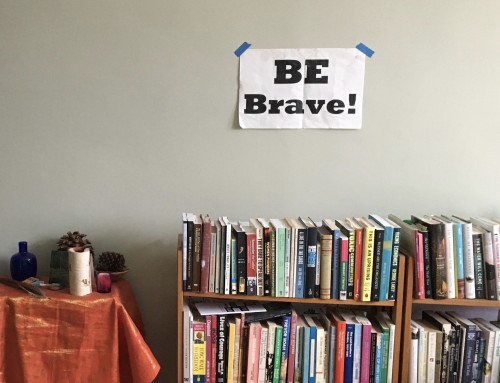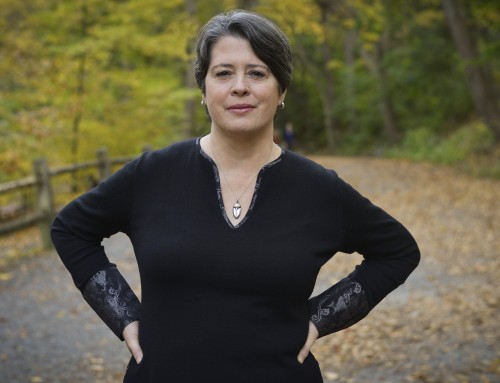I was unlocking the padlock on our community garden when a car halted near the gate. There were a few young men, and one shouted out to me: “I’ve never understood how you can call it a ‘community garden’ and then put a lock on it.” His tone was belligerent, possibly alcohol induced, since the garden is across from two bars and surrounded by neighbors who wanted a parking lot there instead of a garden. Still, I took the bait and tried to explain that “community” didn’t mean “public” and that he was welcome to join the garden for ten dollars and some labor on work days. Although I thought I was being quite civil, the man in the passenger seat yelled “Yuppy bitch!” at me, and the car sped off. As my husband watered the raspberries, I wondered whether it was picking fresh basil that made us yuppies, or the fact that there was a lock on the garden. It seemed unlikely it was just the ten dollar membership fee.
In the two weeks since this happened, I’ve wondered more about the difference between “public” and “community,” especially as the high temperatures have made it good swimming weather. When we just want a quick dip, we go to the nearby city-run pool. However, when we want to spend the afternoon splashing with friends, we have to pay a guest fee. See, almost every family we know belongs to a private pool or country club.
The private clubs have some notable advantages. Most offer baby pools, a godsend to mothers of children shorter than three feet, the shallowest end of the public pool. This advantage cannot be underestimated, especially if you have multiple children and weak nerves. If I could have afforded a private pool when my children were smaller, I would probably have done it since going to the three-foot pool with a baby and a toddler was so stressful. That’s when I got into the habit of visiting my friends at their pools. Managing young children is easier with friends around anyway, and I worked out that a summer of occasional guest fees was actually cheaper than pool membership. Since then, my children have gotten taller and our finances have eased so that the private/public pool choice presents something of a dilemma for us.
Most private pools have large locker rooms; one even has a steam room. Although there is a country club where the changing room is not much nicer than the public pool’s, you can get a gin and tonic at the club snack bar, which makes up for a lot. There’s no snack bar at the public pool, though that may actually be an advantage since it eliminates the whining for snacks. In terms of how clean or crowded the water is, I haven’t noted any real difference. If anything, the public pool is less crowded, though there are no lap lanes for adults and no lounge chairs in the shade. Frankly, the most striking difference between the pools is the one no one ever mentions: at the private pools almost everyone is white, while at the public pool almost everyone is black.
This stark segregation is my biggest reservation about joining a private pool. I like the fact that my children experience being in the racial minority when we go to the public pool. I like that they are not afraid to walk though a crowd of African American boys sitting on their bikes in the lot next door. I don’t want them to think that an all white world is normal in this diverse city. I also don’t want them to develop the sense of entitlement that I associate with belonging to private clubs, though frankly it may be too late for that. When my son Luke said he wanted to join the group lesson offered for free every evening at the public pool, his older sister said with disdain, “I would like private swim lessons.” To be fair to her, this may have come from self-consciousness as much as snobbery.
I wonder how much the private swim club phenomenon stems from snobbery and how much from the simple habit of going with the communal flow. A few friends have told me that they didn’t even know there were public pools. They just joined the pool all their friends belonged to. And that’s the source of the dilemma for me: I want to be where my friends are too. Although their pools are not “public” there is much more of a “community” in those settings where mothers share snacks and sunscreen and offer to watch each other’s children. I think back to my encounter at the garden gate and wonder if it’s possible to build community without having members and non-members. This is an uncomfortable thought, since I don’t want to be part of any groups that are exclusionary, though in reality I am. The garden, for one, has a lock to keep out the people who throw beer bottles near our fence. I don’t feel bad about our lock since our ten dollar a year fee is not prohibitive, and we are a more racially diverse group than either kind of pool. We do, however, discriminate against those who use pesticides, defining ourselves as an organic community garden. Most communities have something that defines them, though it may be interests or beliefs rather than race or class.
Even though I think our gardening community is pretty open and welcoming, it’s clear that the white working class families that live across from the garden resent our presence. I don’t think it was an accident that I was called a “yuppy bitch,” as opposed to some other insult. Our membership probably is more middle class than the garden’s immediate neighbors, and the man’s anger towards me was a reminder of the class divisions we often don’t think about.
I was prompted to think and talk about class at the Quaker conference I attended a few weeks ago when I went to an evening workshop on the subject. The facilitator, George Lakey, asked participants to get into a line from one end of the room to the other in order of our social class at the age of twelve. We had to ask each other questions like, “Did your parents go to college?” or “Did your go to a private pool?” in order to decide who went where in the line. The evening got me in touch with my own mixed feelings about my upbringing. My parents hadn’t gone to college and never owned a home, which put me at the bottom end of the line. However, I went to private school and took horseback riding lessons, which made the people near me in line ask, “What are you doing down here?”
The gift of that upbringing is that I feel comfortable at either the public or the private pools. The problem is that I feel uncomfortable choosing between the two.




Such an interesting post.
About the community garden, it sounds wonderful, but if the local working class neighbors feel resentful and aren’t involved, it’s probably because, for whatever reason, they feel unwelcome, even if that’s not the intention of the gardeners.
What about offering the first year free for neighbors on the block, as a good-will gesture? Even if most choose not to be involved, the invitation might ease the relationship.
If a bunch of outsiders made a garden in my neighborhood and put a lock on it, I know I’d feel locked out.
this very same pool question, with identical implications, has been worrying me as well. All my friends go to private pools as well, and most have better financial positions than I do. my girls are comfortable around all races thus far, because we’ve made deliberate choices, but as they get older, it gets more and more complicated. Nice to see others wrestling with these dilemmas as well.
Thanks for your comments, Sandra and Jackie. I’ve been thinking about Sandra’s suggestion about making the garden more welcoming to the people across the street. Unfortunately I wasn’t involved at the very beginning, so I don’t know how relations turned sour, but I sense there is a lot of history. The people who started the garden live only two blocks away from it, and the rest of us live within walking distance, so we don’t really think of ourselves as outsiders to the neighborhood. But the people who live on that particular block have special parking problems, mostly because of the two bars, I suspect, as well as the fact that there are apartments with street parking. So they wanted a parking lot instead of a garden, though to my knowledge there was no one planning to pay to have a parking lot built. Our group tried to get permanent garden status and proposed a plan that included paving parking spaces around the perimiter of the garden to accomidate that need, but the neighbors rejected that plan, making it impossible for us to get permanent community garden status. As a result there is now bad feeling on our side as well since now the property will probably be developed into new housing, which will only exaccerbate the parking problem.
It does seem that there ought to have been a way for our two groups to work together, though I frankly haven’t had the energy to invest in the process (see my recent post Welcome, Welcome for a few reasons why). The best I’ve been able to do was to offer lettuce to a man who denouced us at the community meeting when I saw him one day just as I was picking some Romaine. He seemed pleasantly surprised and then shared with me the digestive problems that kept him from eating greens. That’s as far as I’ve gotten with peace-making.